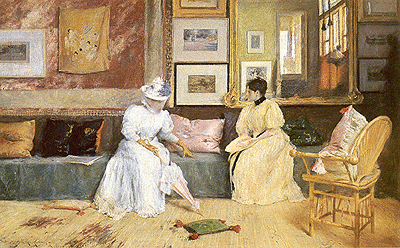by Carla Seaquist | Mar 18, 2020 | Short Story
Look, I’ll be straight with you—and none of this is for publication. The Secret Service is, after all, secret. But when Mac pulled me off the President’s detail and assigned me to head Hers, I protested—big-time. The Service has two missions: protection and...
by Carla Seaquist | Mar 18, 2020 | Short Story
O Maurice! Where is thy briefcase? O former desk-mate! Where is thy brio? Maybe it’s my imagination acting in a highly irregular way, but Maurice’s presence is still so vivid that I look over at his old desk and, I swear, it actually “vibrates” with his “aura,” if...

by Carla Seaquist | Mar 18, 2020 | Short Story
Being about the nature of friendship in the Capital City Hello, I’m your docent for this afternoon’s tour. By your maps and cameras, I see you’re turistas, no? Heigh-ho, follow me, please. We begin with this painting by William Merritt Chase, American, 1849-1916. ...
